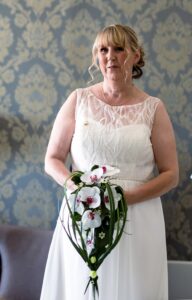“Not all breast cancers can be felt, go for your mammogram.” – breast cancer survivor Mary urges others to attend their breast screening appointments
A nurse and breast cancer survivor from Blackpool is urging others to go for their mammograms, after newly published data shows around a third of eligible people in the region didn’t take up their invitations.
Mary Rigby, who is 55, was diagnosed with grade 1 cancer in September 2022, following her second routine mammogram. She said: “I went for my mammogram on 23 July, and although I had no signs of symptoms, I was called back to have a repeat mammogram and a biopsy taken. I suspected then that it was cancer.
“On the morning of my wedding, on the 9 September, the breast care nurse called, and I asked for her to call back the following Monday, when they arranged a bone scan and an MRI.
“Unfortunately, following the MRI, they found a further area in my other breast which also turned out to be cancer. So bilateral breast cancer.”
Mary’s treatment included Therapeutic Mammoplasty on both breasts, bilateral sentinel lymph node biopsies, and then a course of high-intensity radiotherapy.
She said: “Although the high-intensity radiotherapy is fewer sessions, as it was bilateral, I was left feeling completely exhausted.”
When asked what advice she’d give to women who are invited for their screening, Mary said: “Not all breast cancer can be felt. The mammogram detected something that even the consultant couldn’t feel, so please just go for your mammogram. It could save your life.”
Mary is just one of the more than 2,400 women across the North West who was diagnosed with cancer following breast screening in 2022 – 23, who otherwise may have been diagnosed at a later stage.
Recently published NHS England screening data showed that last year, 66.7% of eligible people attended their mammograms in the North West, meaning more than 90,000 people didn’t take up the invite.
National figures on Cancer Survival in England show that 91% of women diagnosed at an early stage of breast cancer, where the tumour is small (stage 1), have a survival rate of at least five years.
The five-year survival rate for diagnosis at a late stage, where the cancer has spread to other parts of the body (stage 4), is 39%.
Under the NHS Breast Screening Programme, eligible women will usually receive their first routine invitation for breast cancer between the ages of 50 and 53, and will normally be invited every three years until they are 70.
Women should look out for their invitation letter and follow the instructions to book an appointment at their local screening service.
Dr Michael Gregory, Regional Medical Director for NHS England North West said: “Mary’s story show just how effective the breast screening programme is in the early detection of cancer, and just how important it is to attend when you’re invited – even if your previous mammogram was clear.
“Breast cancer is one of the most common types of cancer, but also has one of the highest survival rates, which is in part thanks to the breast screening programme, as early detection makes all the difference.
“If you’ve been invited for your mammogram, I would encourage you to book your appointment as soon as you can, as it could save your life.”
NHS England is also asking women of all ages to be aware of their breast health and to know how to check themselves for cancer symptoms. Being ‘breast aware’ means getting to know how your breasts look and feel at different times and telling your doctor straight away if you notice any unusual changes.
It takes only a few minutes to perform and can help detect breast cancers at an earlier stage.
It is important that women continue to look at and check their breasts regularly, even if they have had a recent mammogram. Anyone who has noticed any abnormal changes should contact their GP as soon as possible.
Women are encouraged to use the ‘TLC’ method for checking their breasts and can visit Breast Cancer Now for more information:
- TOUCHyour breasts. Can you feel anything new or unusual?
- LOOKfor changes. Does anything look different?
- CHECKany new or unusual changes with your GP
